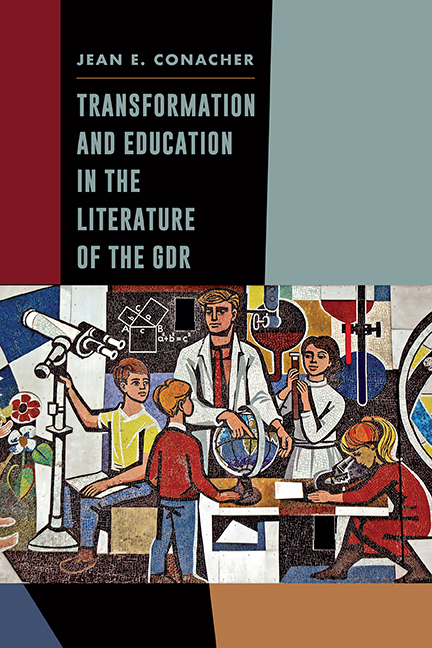Book contents
- Frontmatter
- Dedication
- Contents
- List of Illustrations
- Acknowledgments
- List of Abbreviations
- Introduction: The Postwar Desire for Renewal
- 1 Shaping the Cultural and Educational Landscape in the Soviet Occupation Zone (SBZ)
- 2 Interweaving GDR Education and Cultural Policy toward a National Literature
- 3 Critiquing the Norm in Steinmann' Die größere Liebe, Wolf' Der geteilte Himmel, and Kant' Die Aula
- 4 “Ich bin. Wer?“: Subjectivity and Transformation in Wolf' Nachdenken über Christa T. and Reimann' Franziska Linkerhand
- 5 “Wem geben wir Einsen … ?” Meritocracies and Reward in de Bruyn' Die Preisverleihung and Plenzdorf' Die neuen Leiden des jungen W.
- 6 “Mir geht es gut”: Challenging Stagnation in Hein' Der fremde Freund and H�ntsch' Wir sind keine Kinder mehr
- Conclusion
- Appendix A Text-Internal Functions of Narrative Triangle (Left Side)
- Appendix B Text-External Functions of Narrative Triangle (Right Side)
- Notes
- Bibliography
- Index
1 - Shaping the Cultural and Educational Landscape in the Soviet Occupation Zone (SBZ)
Published online by Cambridge University Press: 25 March 2020
- Frontmatter
- Dedication
- Contents
- List of Illustrations
- Acknowledgments
- List of Abbreviations
- Introduction: The Postwar Desire for Renewal
- 1 Shaping the Cultural and Educational Landscape in the Soviet Occupation Zone (SBZ)
- 2 Interweaving GDR Education and Cultural Policy toward a National Literature
- 3 Critiquing the Norm in Steinmann' Die größere Liebe, Wolf' Der geteilte Himmel, and Kant' Die Aula
- 4 “Ich bin. Wer?“: Subjectivity and Transformation in Wolf' Nachdenken über Christa T. and Reimann' Franziska Linkerhand
- 5 “Wem geben wir Einsen … ?” Meritocracies and Reward in de Bruyn' Die Preisverleihung and Plenzdorf' Die neuen Leiden des jungen W.
- 6 “Mir geht es gut”: Challenging Stagnation in Hein' Der fremde Freund and H�ntsch' Wir sind keine Kinder mehr
- Conclusion
- Appendix A Text-Internal Functions of Narrative Triangle (Left Side)
- Appendix B Text-External Functions of Narrative Triangle (Right Side)
- Notes
- Bibliography
- Index
Summary
ON OCTOBER 4, 1947, a mere thirty months after the unconditional surrender of Germany brought an end to the Second World War, the eastern sector of Berlin became host to a unique pan-German Writers’ Congress, bringing together, as Waltraud Wende-Hohenberger explains, over 250 writers, publishers, and journalists, drawn not only from each of the country's postwar occupied zones but also from diverse countries around the globe. Many had suffered persecution during Adolf Hitler’s regime and been forced into foreign or internal exile; others had spent years in prison or concentration camps. Together once more in Berlin, most hoped to display and promote their cultural solidarity in the face of ever-louder rumors of a deepening political and ideological discord between the Western and Eastern zones that seemed largely driven by the broader international concerns of the occupying forces. Rather than bringing unity, however, discussions on the conference floor were soon dominated by the emergence of deeper personal divisions, as participants shared their experiences of the Hitler years. Telling rifts quickly appeared between foreign and internal exiles, older and younger writers, those who had actively resisted and those who had not; each group sought, it seemed, to justify its experience as the most authentic, the most profound, the most harrowing; each seemed ready to condemn others for not sharing it.
The 1947 Writers’ Congress represented both an emotional release for many participants deeply traumatized by their experiences and a possible first step in establishing common purpose among German writers and artists in the postwar years. Yet the majority of participants were far from able to take up the plea of Alexander Dymschitz, the Soviet officer directing cultural policy in the Soviet Occupation Zone (SBZ), who called on all (regardless of where they now found their home) to relinquish their current concerns and face the challenges of creating a better future for Germany, earning the respect of the German people, and contributing to what he termed their readers’ “geistige Umerziehung.” In an essay twelve months before, Dymschitz had been even more explicit: “um Erzieher der Massen zu sein, muß der Dichter Pädagoge sein, ein Lehrer des Volkes. Er muß, wie Lenin sagt, ‘seinem Leser etwas voraus sein.’”
- Type
- Chapter
- Information
- Publisher: Boydell & BrewerPrint publication year: 2020

